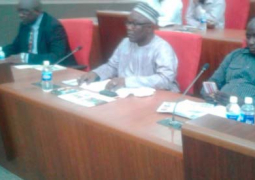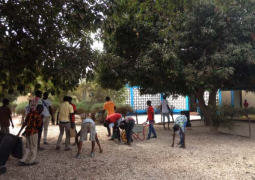
The lower court in Banjul presided over by Principal Magistrate Omar Cham Monday rejected the defence application, for the court to review the bail sum of D100 million with two Gambian sureties granted to Ansumana Jammeh, Sanna Bah and Assan Badjie respectively.
The trio were jointly charged with conspiracy, and Ansumana Jammeh was further charged with official corruption.
The defence submitted that the bail bond against their clients was excessive, and it was for that reason they are appealing for the same court to reverse it.
Prior to the defence application for review, police prosecutor Chief-Inspector Camara acknowledged receiving a notice of motion supported with an affidavit urging the court to review the order of the court, dated 21 April 2016.
He added that the affidavit contains thirteen paragraphs.
In moving the motion, counsel Uzuma Achigbue submitted that the motion dated 21 April 2016 was asking the court for a review of its order, when it granted the accused persons bail on the same date.
According to counsel, their application was in line with the inherent jurisdiction as well as section 226 of the Criminal Code (CC), adding that the affidavit in support of the motion was sworn to by one Kebba Sanneh, a legal clerk, and they wish to rely on all paragraphs especially paragraph 4 to 12.
“As we speak, we have not received any affidavit in opposition,” he added.
“The grounds of our applications are that in as much as you have the powers to postpone this case to any date, as well as either remand or grant bail to the accused persons on such terms and conditions as you may decide, in accordance with the law, you also have such powers to review,” lawyer Uzuma said.
Further trying to persuade the court, he argued that by looking at the charge sheet upon which the accused persons were arraigned, the alleged sum was less than forty-six million dalasi which they were charged with jointly and severally.
“With that arithmetic Your Worship can see the difference with the amount of hundred million dalasi for each applicant as a bail bond,” counsel told the court.
This was why they have deposed to the facts that these terms could not be fulfilled by the accused persons, and these facts had not been controverted, he stated.
Continuing further, the defence said: “We have also made it in our affidavit that before being charged, they were enjoying the sum of 30 million dalasi bail bond from the police.”
Once the court exercised its jurisdiction in favour of the accused persons, there would be sureties willing and ready to take the accused persons on bail, he said.
All those facts had not been controverted and, as for the purpose of the application, those are the only things necessary for the determination of the case, counsel Uzuma added.
“We, therefore, urged you to review the amount of the bail bond taking into consideration section 99 subs 2 of the Criminal Code and exercise your discretion in favour of the accused persons.”
Replying to the defence application, prosecutor Camara informed the court that they were vehemently objecting to counsel’s application for the bail conditions of the accused to be reviewed.
At this juncture, lawyer Uzuma interjected and argued that the prosecution could not react by way of facts, but on points of law.
However, the trial magistrate said he should be allowed to continue.
Prosecutor Camara further submitted that they are upholding the decision of the court on bail dated 21 April 2016.
“The conditions given by the court are genuine enough, and for the prosecution it seems just.”
According to the prosecutor, on paragraph ten of the motion, they were not aware of any bail granted to the accused persons as far as the prosecution was concerned.
He said since the prosecution was also minded with the fundamental rights of the accused persons, the prosecution would leave it with the court to decide.
Prosecution was still urging the court to maintain the conditions levied on the accused persons, and set aside the motion filed by the defence, he added.
Delivering the ruling, the trial magistrate said he had listened to both the application of the defence and the prosecution’s objection.
“I’m not convinced that I can review my own orders, but the High Court can do it,” said Cham.
The case was then adjourned until 28 April 2016, for hearing.



